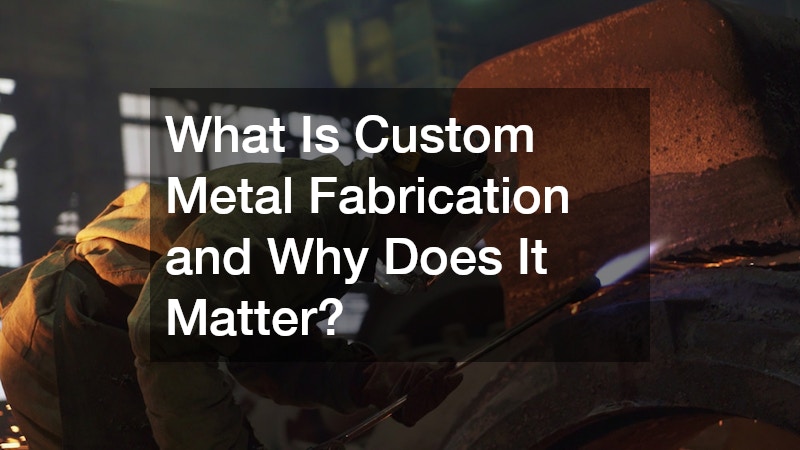Custom metal fabrication is a pivotal process in numerous industries, shaping the way we design, produce, and utilize metal components. This article aims to unpack the intricacies of custom metal fabrication, defining its processes and underscoring its importance across various sectors. From automotive to aerospace, custom metal fabrication plays a crucial role in advancing technology and creating tailored solutions that meet the unique demands of modern engineering.
What is Custom Metal Fabrication?
Definition and Processes
Custom metal fabrication involves creating metal products that are specifically designed for unique applications. At its core, the process includes techniques such as cutting, bending, and assembling metals to create complex products. By leveraging advanced methods like CNC machining and laser cutting, custom metal fabrication achieves precise results tailored to specific industry requirements.
The first stage often involves detailed design and engineering work, ensuring that the final product meets specific client specifications. This is followed by material selection, where factors like durability and cost are considered to select the most appropriate metals. Finally, the fabrication phase brings the design to life through skilled craftsman activities like welding, forming, and finishing.
Welding, a crucial part of metal fabrication, ensures the integrity and strength of the assembled products. Techniques like TIG and MIG welding are commonly used in custom fabrication to join different metal components. Effective welding not only enhances the structural integrity of metal products but also contributes to their aesthetic appeal and precision fit.
Common Applications
Custom metal fabrication finds its application across a diverse array of industries, owing to its versatility and adaptability. In the automotive industry, it is used for designing specific vehicle parts that require unique shapes and strengths. By creating tailor-made components, manufacturers can improve vehicle performance and comply with safety standards.
The construction industry also heavily relies on custom metal fabrication for structures like beams, frames, and intricate architectural components. These custom solutions are essential for tackling complex engineering challenges and ensuring structural stability. Additionally, the ability to fabricate components on demand reduces the time and cost spent on large-scale construction projects.
In the aerospace sector, the precision required for parts used in aircraft and spacecraft manufacturing makes custom metal fabrication indispensable. The process ensures that components meet stringent standards for performance, durability, and safety. With advancements in fabrication technologies, these industries continue to push the boundaries of engineering and innovation.
How Custom Metal Fabrication Differs from Standard Fabrication
Customization versus Standardization
The primary difference between custom and standard metal fabrication lies in the level of customization involved. While standard fabrication focuses on producing generic, mass-market products, custom fabrication is tailored to meet individual specifications. This flexibility is key to addressing unique challenges faced by businesses and industries, allowing for greater innovation and specialization.
In custom fabrication, each project is approached with a design-specific mindset, ensuring products are perfectly aligned with client needs. This stands in contrast to standard fabrication, which often retains a one-size-fits-all approach to manufacturing. The prowess of custom metal fabrication lies in transforming bespoke ideas into tangible solutions.
Ultimately, custom metal fabrication empowers businesses to distinguish their products from competitors through unique designs and applications. This not only benefits consumer satisfaction but also drives an increase in business opportunities for companies that offer bespoke fabrication services. Customization enables a competitive edge in today’s dynamic marketplace, where product differentiation is critical.
Benefits of Customization
Opting for custom metal fabrication offers several benefits, starting with the ability to tailor solutions to exact specifications. This ensures that the final product delivers enhanced functionality, meeting the precise needs it was designed for. Additionally, custom fabrication often leads to better product quality and reliability, as each component is crafted with meticulous attention to detail.
Another advantage is the potential for innovation, as custom fabrication allows for experimentation with materials, designs, and techniques. This opens the possibility for pioneering new products and expanding technological capabilities. Furthermore, customized metal components often result in greater operational efficiency, leading to lower costs and increased productivity.
The economic benefits of custom metal fabrication also extend to reduced waste, as materials can be precisely measured and used efficiently. This results in a more sustainable manufacturing process, contributing to environmental responsibility and conservation. As industries continue to adopt eco-friendly practices, custom metal fabrication provides a conduit for sustainable growth and development.
Why Custom Metal Fabrication is Important for the Industry
Impact on Innovation
Custom metal fabrication significantly contributes to innovation, as it allows industries to push the boundaries of what is possible in design and manufacturing. By enabling the creation of complex shapes and intricate components, it fosters creativity and aids in developing cutting-edge technologies. The ability to customize also drives innovation by solving industry problems with unique solutions rather than traditional approaches.
Manufacturers leverage custom metal fabrication to develop prototypes and test new concepts, accelerating product development timelines. This rapid prototyping capability means ideas can be quickly translated into reality, facilitating swift market adaptation. Consequently, industries can stay ahead of the competition by consistently offering innovative products and services to their clientele.
Economic and Ecological Benefits
From an economic perspective, custom metal fabrication offers notable advantages, such as cost efficiency and product optimization. By creating precisely engineered components, businesses can reduce overhead costs associated with material waste and simplify assembly processes. Furthermore, custom fabrication often leads to extended product lifecycles, eliminating the need for frequent replacements and reducing overall expenses.
The ecological benefits of custom metal fabrication are substantial, particularly regarding material sustainability. By optimizing resource usage and reducing waste, this approach aligns with initiatives aiming at achieving a more circular economy. Sustainable practices in metal fabrication contribute to decreased carbon footprints while conserving valuable natural resources.
Custom metal fabrication stands as a cornerstone of modern industry, offering significant economic, ecological, and innovative benefits. The tailored approach ensures precision and quality while facilitating rapid advancements in technology. As industries continue to evolve, the value of custom metal fabrication will only increase, heralding a future of limitless design and manufacturing possibilities.

